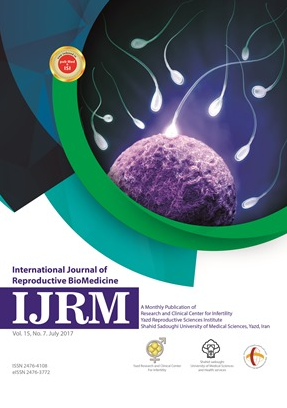
International Journal of Reproductive BioMedicine
ISSN: 2476-3772
The latest discoveries in all areas of reproduction and reproductive technology.
Comparison of pregnancy outcome in intrauterine insemination-candidate women with and without endometrial scratch injury: An RCT
Published date: Jun 23 2021
Journal Title: International Journal of Reproductive BioMedicine
Issue title: International Journal of Reproductive BioMedicine (IJRM): Volume 19, Issue No. 5
Pages: 457–464
Authors:
Abstract:
Background: Endometrial scratch injury is considered controversial in increasing the success rate of assisted reproductive technology.
Objective: To compare the pregnancy outcomes in women undergoing intrauterine insemination with and without an endometrial scratch.
Materials and Methods: In this randomized clinical trial, 150 women referred to the Fatemieh Hospital, Hamadan, Iran who were candidates for IUI between December 2017 and December 2018 were randomly assigned into two groups (n = 75/each) with or without an endometrial scratch (as case and control groups, respectively). Women in both groups were in proper and identical protocol for IUI. Chemical and clinical pregnancies, abortion, and live birth rate, also pregnancy complications were compared between the groups.
Results: Chemical and clinical pregnancy rates were higher in the case than the control group (p = 0.25, p = 0.54, respectively). In the case group, the abortion and multiple gestation rates were 14.3% and 4.3%, respectively, while it was 5% in the control group (p = 0.60, p = 0.54 respectively). The endometrium thickness on day 21 was higher in the case group than the control (p = 0.01).
Conclusion: Endometrial scratching in intrauterine insemination women is not associated with an increase in both clinical and clinical pregnancy rates, however, studies with a larger sample size are recommended to evaluate this intervention.
Key words: Pregnancy infertility, Women, Endometrial injury, Pregnancy, Intrauterine insemination.
References:
[1] Senocak GC, Yapca OE, Borekci B. Comparison of pregnancy rates between patients with and without local endometrial scratching before intrauterine insemination. J Gynecol Obstet Hum Reprod 2017; 46: 687–690.
[2] Allahbadia GN. Intrauterine insemination: Fundamentals revisited. J Obstet Gynaecol India 2017; 67: 385–392.
[3] Akanji Tijani H, Bhattacharya S. The role of intrauterine insemination in male infertility. Hum Fertil (Camb) 2010; 13: 226–232.
[4] El-Khayat W, Elsadek M, Saber W. Comparing the effect of office hysteroscopy with endometrial scratch versus office hysteroscopy on intrauterine insemination outcome: A randomized controlled trial. Eur J Obstet Gynecol Reprod Biol 2015; 194: 96–100.
[5] Zarei A, Alborzi S, Dadras N, Azadi G. The effects of endometrial injury on intrauterine insemination outcome: A randomized clinical trial. Iran J Reprod Med 2014; 12: 649–652.
[6] Salehpour S, Zamaniyan M, Saharkhiz N, Zadeh Modares S, Hosieni S, Seif S, et al. Does intrauterine saline infusion by intrauterine insemination (IUI) catheter as endometrial injury during IVF cycles improve pregnancy outcomes among patients with recurrent implantation failure? An RCT. Int J Reprod Biomed 2016; 14: 583–588.
[7] Nastri CO, Lensen SF, Gibreel A, Raine-Fenning N, Ferriani RA, Bhattacharya S, et al. Endometrial injury in women undergoing assisted reproductive techniques. Cochrane Database Syst Rev 2015; 2015: Cd009517.1–66.
[8] Karimzadeh MA, Ayazi Rozbahani M, Tabibnejad N. Endometrial local injury improves the pregnancy rate among recurrent implantation failure patients undergoing in vitro fertilisation/intra cytoplasmic sperm injection: A randomised clinical trial. Aust N Z J Obstet Gynaecol 2009; 49: 677–680.
[9] Vitagliano A, Noventa M, Saccone G, Gizzo S, Vitale SG, Laganà AS, et al. Endometrial scratch injury before intrauterine insemination: Is it time to re-evaluate its value? Evidence from a systematic review and meta-analysis of randomized controlled trials. Fertil Steril 2018; 109: 84–96. e4.
[10] Tada Y, Kitaya K, Amano N, Kobatake M, Hayashi T, Taguchi S, et al. A pilot survey on obstetric complications in pregnant women with a history of repeated embryo implantation failure and those undergoing single local endometrial injury. Clin Exp Obstet Gynecol 2015; 42: 176–178.
[11] Abdelhamid AM. The success rate of pregnancy in IUI cycles following endometrial sampling. A randomized controlled study: Endometrial sampling and pregnancy rates. Arch Gynecol Obstet 2013; 288: 673–678.
[12] Karimzade MA, Oskouian H, Ahmadi S, Oskouian L. Local injury to the endometrium on the day of oocyte retrieval has a negative impact on implantation in assisted reproductive cycles: A randomized controlled trial. Arch Gynecol Obstet 2010; 281: 499–503.
[13] Requena A, Cruz M, Pacheco A, García-Velasco JA. Ongoing pregnancy rates in intrauterine insemination are affected by late follicular-phase progesterone levels. Fertil Steril 2015; 104: 879–883.
[14] Potdar N, Gelbaya T, Nardo LG. Endometrial injury to overcome recurrent embryo implantation failure: A systematic review and meta-analysis. Reprod Biomed Online 2012; 25: 561–571.
[15] Finn CA, Martin L. Endocrine control of the timing of endometrial sensitivity to a decidual stimulus. Biol Reprod 1972; 7: 82–86.
[16] Zhou L, Li R, Wang R, Huang HX, Zhong K. Local injury to the endometrium in controlled ovarian hyperstimulation cycles improves implantation rates. Fertil Steril 2008; 89: 1166–1176.
[17] Gellersen B, Brosens IA, Brosens JJ. Decidualization of the human endometrium: Mechanisms, functions, and clinical perspectives. Semin Reprod Med 2007; 25: 445–453.
[18] Karizbodagh MP, Rashidi B, Sahebkar A, Masoudifar A, Mirzaei H. Implantation window and angiogenesis. J Cell Biochem 2017; 118: 4141–4151.
[19] Torry DS, Leavenworth J, Chang M, Maheshwari V, Groesch K, Ball ER, et al. Angiogenesis in implantation. J Assist Reprod Genet 2007; 24: 303–315.